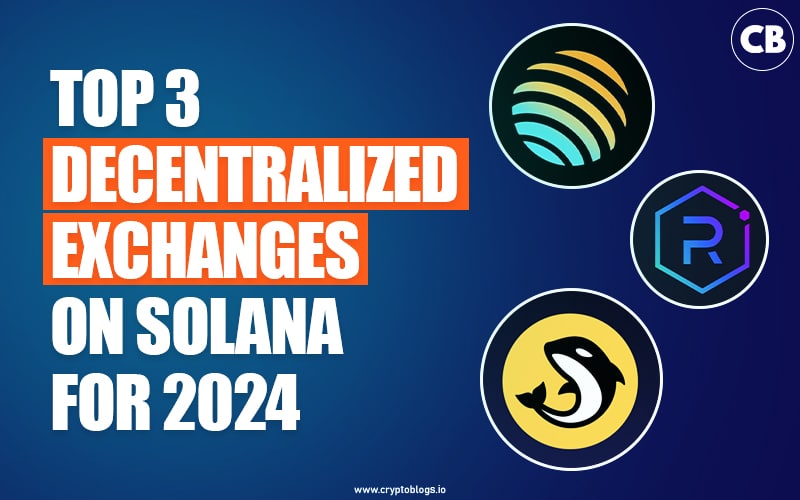Solana has currently emerged as one of the fastest, low cost as well as most efficient blockchain network in the crypto space. It has also become the first choice of blockchain for launching memecoins due to its low fee for deploying token smart-contracts and sending transactions. All these factors have led the DeFi ecosystem on Solana to have a massive boost with a variety of decentralized applications (dApps) deployed on top of it.
While there are a number of dApps available on Solana for functionality which include swapping crypto assets, the task of choosing one among all is quite difficult.
Here we have sorted the top three decentralized exchanges that offer best swapping functionality with robust liquidity.
Decentralized exchanges on Solana
Decentralized exchange platforms on Solana offer cutting-edge solutions for seamless cryptocurrency trading. Leveraging Solana’s high-speed blockchain technology, these platforms ensure swift transaction processing at minimal fees. With innovative features and robust security measures, Solana-based decentralized exchanges provide users with a reliable and efficient trading experience in the decentralized finance (DeFi) space.
Following are the three leading decentralized exchange platforms on Solana that have attracted masses in the current market trend.
1. Jupiter
Jupiter is a decentralized exchange (DEX) aggregator platform on Solana. It is designed to facilitate swaps at a best price across different decentralized exchanges. Jupiter offers features such as limit orders, dollar cost averaging (DCA) as well as acting as a bridge to transfer assets to Solana from other blockchain networks.
Launched in 2021, Jupiter kickstarted the DeFi ecosystem on Solana by allowing seamless swaps of Solana-based cryptocurrency assets. It is currently the most used decentralized application in the Solana ecosystem with processing billions of transactions on a daily basis. Jupiter also has native token JUP that is empowering the community and ensuring growth of the platform.
As there are a number of DEXs on Solana and each will have isolated liquidity pools, all of them will have different prices for a particular token. Jupiter connects all these exchanges to collect data such as market liquidity, assets prices, slippage rates, etc. This data is further used to initiate a route for performing token swaps which is executed from Jupiter’s simplified user interface (UI). In its latest update, Jupiter has also added decentralized perpetuals in beta release.
Here are the latest stats on Jupiter (April 1, 2024)
| 24 Hour Volume | $1.67 Billion |
| Total TradingVolume (till date) | $134 billion |
| Unique Wallets | 310,344 |
Key Features & Functionality of Jupiter
Besides enabling swaps, Jupiter offers different features and functionalities:
- Limit Orders: Just like centralized exchanges, users can place buy or sell limit orders for an asset. The orders will be executed when the market price of asset matches with predefined order price.
- Dollar Cost Averaging (DCA): This is the best strategy to purchase an asset whose price fluctuates too often. Here, users place buying or selling orders which will be periodically executed within a timeframe, for example- 30 orders in 1 hour or 1 order every minute.
- Cross Chain Bridge: Jupiter has integrated a crosschain bridge ‘Comparator’ to aggregate fund transfer between multiple blockchain networks. It currently allows moving assets from 9 blockchains including Ethereum, Polygon, BNBChain, Optimism and others.
- Decentralized Perpetuals: Jupiter also allows decentralized perpetuals trading for assets like SOL, ETH and WBTC on up to 100x leverage.
How to swap tokens on Jupiter
Trading on Jupiter is easy. Swapping tokens is quick and effortless, thanks to its user-friendly interface. Whether you’re new to trading or an experienced user, Jupiter makes it easy for everyone.
Step 1: Visit Jupiter’s official website (https://jup.ag/) and connect your Solana-compatible crypto wallet.
Step 2: If you want to swap tokens, choose Token 1 as the token in your wallet and choose Token 2 as the token you wish to swap in.
Step 3: Enter the amount you wish to swap.
Now consider the slippage setting and make sure it’s not too high. Average slippage will be between 0.1% to 0.5%. You can also set it to auto but it might not provide the best swapping price.
Step 4: Click on the ‘Swap’ button to approve your transaction and that’s it. You will receive swapped tokens into your wallet once the transaction is complete.
Jupiter is one of the easiest decentralized exchange aggregators available in the DeFi ecosystem.
Raydium
Raydium is an automated market maker (AMM) and decentralized exchange on Solana. It uses a central orderbook for enabling trading and converts resident liquidity to limit orders in the decentralized orderbook. Unlike other decentralized exchanges, Raydium not only offers swapping, it also allows third party order flow by providing liquidity to a central orderbook.
The faster execution speed of Solana blockchain enables Raydium to execute trading orders quickly while at a low cost. Users can create new liquidity pools or provide liquidity to Raydium’s existing liquidity pools to earn swapping fees. Furthermore, liquidity providers can also stake their LP tokens to earn Raydium’s native RAY tokens.
Raydium Stats (April 1, 2024)
| 24 Hour Volume | $230 million |
|---|---|
| Total TradingVolume (till date) | $53 billion |
| TVL | $660 million |
Key Features & Functionality Raydium
Raydium allows users to swap assets while also enabling liquidity providers to earn passive yields. Following are its features and functionality:
- Liquidity Pools: Users can swap tokens using liquidity pools or they can also provide liquidity to earn yields. Whenever a swapping takes place, Raydium will charge a minimal fee that directly goes to liquidity providers.
- Yield Farming: In addition to providing liquidity, users can also stake their LP tokens to earn additional rewards in the form of RAY tokens.
- Accelerator: Raydium also has an accelerator program where new tokens can be launched easily while addressing a wide audience.
How to Swap on Raydium?
Swapping tokens on Raydium is the same as swapping tokens on any other decentralized exchange.
Step 1: Visit the official Raydium website (https://raydium.io/swap/) and connect your wallet.
Step 2: Choose the assets you want to swap, Token A as your own asset and Token B as asset you want to swap in.
Step 3: Check price impact and make sure slippage is not high (0.1% to 0.5% average).
Step 4: Click on Swap and wait until the transaction is executed.
Raydium is often reviewed as slow and laggy DEX due to its heavy backend. Although it has one of the highest liquidity among all DEXs on Solana.
Orca
Orca is a leading DEX on Solana that stands out with its feature of concentrated liquidity pools. It has one of the best user interfaces among all DeFi protocols on Solana which is much easier to understand even for beginners. The concentrated liquidity model of Orca enables liquidity providers to make use of their liquidity between specific range of trading amount.
Orca Stats (April 1, 2024)
| 24 Hour Volume | $369 million |
|---|---|
| Total TradingVolume (till date) | $36 billion |
| TVL | $257 million |
Key Features & Functionality Orca
Following are the best features and functionality offered by Orca;
- Concentrated Liquidity: Liquidity providers can choose when their liquidity could be used depending on the trade size. Usually, higher trade size brings more swapping fees and rewards.
- Easy Pool Creation: Launching a liquidity pool with new tokens is easiest on Orca among all other decentralized exchanges. It also offers to set customized liquidity range and fee tier to the pool creator.
- Simple UI: Orca’s UI is simple that every DeFi users – from beginners to professional traders – would find it easy to use.
How to Swap on Orca?
Following is the process of swapping tokens on Orca;
Step 1: Visit the official website (https://www.orca.so/) and connect your wallet.
Step 2: Choose either you want to buy or sell asset by clicking on BUY button and select assets.
Step 3: Enter the amount and let it fetch the best price. Once it shows order details, click on Buy.
And that’s it, you will receive the purchased asset into your wallet post the completion of the transaction.
Conclusion
The above-listed decentralized exchanges currently serve as the best when we consider factors such as liquidity, daily trading volume and unique users. Solana also has several other decentralized exchanges that offer best trading experience. The DeFi ecosystem on Solana is rapidly growing and all these exchanges will play a vital role in boosting its credibility. Solana’s high-speed and low cost infrastructure will allow endless possibilities for the next generation of dApps that are enabling a variety of features and functionalities.







